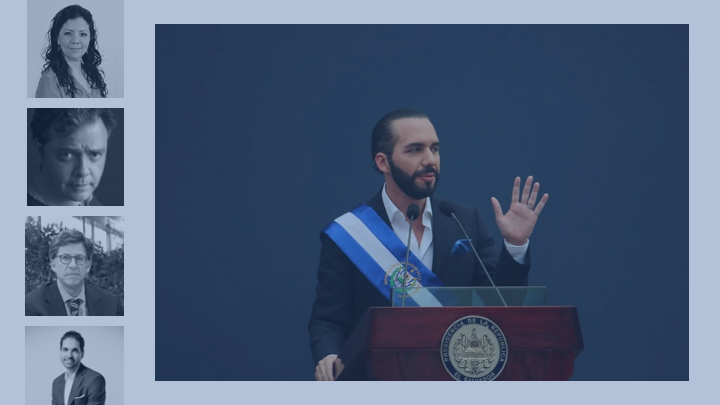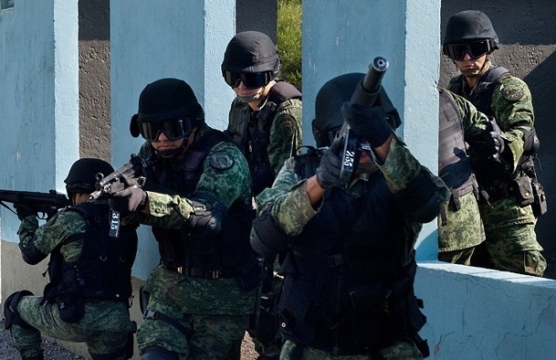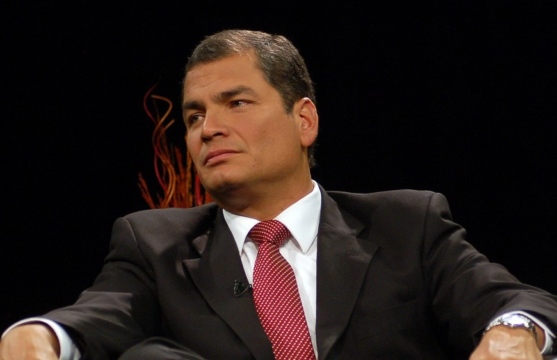IACHR Report on Citizen Security & Human Rights
Citizen security remains a top concern for most Latin American governments as crime and violence spiral out of control and cripple political and economic institutions in the region.
On April 22, the Inter-American Dialogue hosted Pandemic Response and Executive Authority – The Case of El Salvador, a webinar featuring Leonor Arteaga, senior program officer for the Due Process of Law Foundation and member of the El Salvador National Commission for the Search of Disappeared Persons (CONABÚSQUEDA), Carlos Dada, founder of El Faro, and José Miguel Vivanco, executive director of the Americas Division of Human Rights Watch. The event was moderated by Michael Camilleri, director of the Peter D. Bell Rule of Law Program. The conversation focused on recent developments in El Salvador, including President Nayib Bukele's open defiance of the Supreme Court's Constitutional Chamber ruling against arbitrary detention in containment centers for those who break quarantine.
In the face of Covid-19, governments have had to adopt extensive emergency measures. As the president in El Salvador has been given enhanced power, restrictions against civil and political rights are worrisome. Dada indicated that in El Salvador, Bukele was audacious for taking such extreme measures before leaders in the rest of the region, including closing the border and instituting strict social-distancing orders early on. However, he noted that “these measures were not enforced or backed by a medical plan, or a scientific plan," ultimately leaving hospitals and detention centers in disarray. El Salvador does not have a plan in place to deal with the economic repercussions of Covid-19 and Dada also stressed that there are already people going hungry. If people disobey quarantine orders to look for food, the military detains those individuals and decides whether to send them to quarantine centers. Dada’s panorama of the situation demonstrated the dire human rights and health implications of Bukele's decisions.
Arteaga highlighted Bukele’s unwillingness to respect the court’s ruling and the precedent this could bear on checks and balances in the country. The president's lack of compliance, she commented, “is a clear threat to the constitutional separation of powers,” which is a “fundamental component of the rule of law and an essential element of democracy.” Bukele’s consistent disregard for the court and frequent statements on Twitter that encourage hate speech against his critics, should concern not only Salvadorans but the international community as well. She added, “the international community cannot afford to turn a blind eye when such a popular leader openly ignores and provokes that others ignore issues regarding fundamental rights.” Camilleri later revisited the subject of the constitutional showdown and how it could be resolved. Arteaga argued the importance of the international community giving support to the court so that it is empowered to continue its rulings and enforcement. It is equally as vital, she added, that the civil society groups utilizing the judicial system believe that the court is a tool needed for check and balances.
Vivanco echoed the concerns over President Bukele’s approach in managing Covid-19 and stressed the role of the international community in protecting Salvadoran democratic norms. He mentioned policies should be developed that are consistent with basic rights, and highlighted Argentina, Uruguay, Chile and Peru as countries that are fighting Covid-19 while still respecting fundamental freedoms and rights. Their measures contrast starkly with President Bukele’s directives ordered via tweet. Vivanco, like Arteaga, noted that Bukele’s lack of respect and challenge to several rulings of the Supreme Court shows how the rule of law and basic separations of power are in danger in El Salvador. Vivanco called upon the Organization of American States (OAS), stating that it was time for them and particularly “Secretary General Luis Almagro to step in and at least call for a meeting of the Permanent Council of the OAS to discuss to which extent the lack of respect, the lack of enforcement of the rulings of the Supreme Court” represent a challenge to the Inter-American Democratic Charter. He added that the Democratic Charter should be triggered every time there is a serious threat to democratic principles and that it is dangerous to allow the situation in El Salvador to continue without a public statement from the international community.
The event ended with questions from the audience about the work of civil society in El Salvador during the crisis, the effectiveness of the measures taken by President Bukele, and the role of the opposition and civil society in promoting dialogue with President Bukele.
Citizen security remains a top concern for most Latin American governments as crime and violence spiral out of control and cripple political and economic institutions in the region.
Since the outbreak of the drug war, Ciudad Juárez has been plagued by unfathomable levels of violence and corruption, leading to thousands of human rights violations.
In June, President Correa issued a decree creating new procedures for NGOs to obtain legal status. What are its implications?
 Main Photo: Flickr / Carlos Moronta/Presidencia República Dominicana / CC By-NC-ND 2.0
Main Photo: Flickr / Carlos Moronta/Presidencia República Dominicana / CC By-NC-ND 2.0

